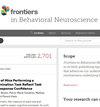智能笼中的食欲动机任务表明,雄性小鼠的空间学习动机成本高于雌性小鼠
IF 2.6
3区 医学
Q2 BEHAVIORAL SCIENCES
引用次数: 0
摘要
智能笼(IC)可以评估小鼠在社会家庭笼中的行为和学习能力。为了克服缺水对小鼠学习的不利影响,我们开发了一种方案,通过小鼠对甜水而非白水的偏好来激发小鼠的食欲,从而促进其空间学习。虽然白水在任何时候都能喝到,但只有正确的任务反应才能获得甜水奖励。在这些条件下,C57BL/6J小鼠成功地掌握了带有逆转的角落偏好任务,并学会了难度更大的带有逆转的时间位置任务。然而,随着任务难度的增加,小鼠对甜水的反应率却大幅下降,这表明学习挑战和获得奖励的成功率降低降低了动物寻找甜水的动机。虽然C57BL/6J雌雄小鼠表现出相似的初始味觉偏好,在简单学习任务中的学习效果也相似,但随着学习挑战的增加,雄性小鼠对甜水的反应率和学习成绩的下降比雌性小鼠更快。总之,我们的数据表明,雄性小鼠在掌握高难度的、以食欲为动机的学习任务方面会比雌性小鼠处于劣势,这可能是由于基于价值的决策中存在性别差异。本文章由计算机程序翻译,如有差异,请以英文原文为准。
Appetitively motivated tasks in the IntelliCage reveal a higher motivational cost of spatial learning in male than female mice
The IntelliCage (IC) permits the assessment of the behavior and learning abilities of mice in a social home cage context. To overcome water deprivation as an aversive driver of learning, we developed protocols in which spatial learning is motivated appetitively by the preference of mice for sweetened over plain water. While plain water is available at all times, only correct task responses give access to sweetened water rewards. Under these conditions, C57BL/6J mice successfully mastered a corner preference task with the reversal and also learned a more difficult time-place task with reversal. However, the rate of responding to sweetened water decreased strongly with increasing task difficulty, indicating that learning challenges and reduced success in obtaining rewards decreased the motivation of the animals to seek sweetened water. While C57BL/6J mice of both sexes showed similar initial taste preferences and learned similarly well in simple learning tasks, the rate of responding to sweetened water and performance dropped more rapidly in male than in female mice in response to increasing learning challenges. Taken together, our data indicate that male mice can have a disadvantage relative to females in mastering difficult, appetitively motivated learning tasks, likely due to sex differences in value-based decision-making.
求助全文
通过发布文献求助,成功后即可免费获取论文全文。
去求助
来源期刊

Frontiers in Behavioral Neuroscience
BEHAVIORAL SCIENCES-NEUROSCIENCES
CiteScore
4.70
自引率
3.30%
发文量
506
审稿时长
6-12 weeks
期刊介绍:
Frontiers in Behavioral Neuroscience is a leading journal in its field, publishing rigorously peer-reviewed research that advances our understanding of the neural mechanisms underlying behavior. Field Chief Editor Nuno Sousa at the Instituto de Pesquisa em Ciências da Vida e da Saúde (ICVS) is supported by an outstanding Editorial Board of international experts. This multidisciplinary open-access journal is at the forefront of disseminating and communicating scientific knowledge and impactful discoveries to researchers, academics, clinicians and the public worldwide.
This journal publishes major insights into the neural mechanisms of animal and human behavior, and welcomes articles studying the interplay between behavior and its neurobiological basis at all levels: from molecular biology and genetics, to morphological, biochemical, neurochemical, electrophysiological, neuroendocrine, pharmacological, and neuroimaging studies.
 求助内容:
求助内容: 应助结果提醒方式:
应助结果提醒方式:


